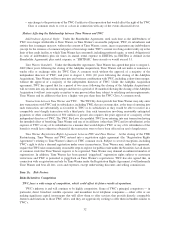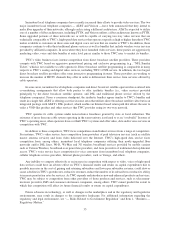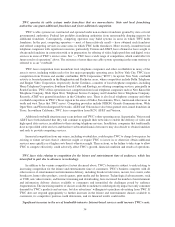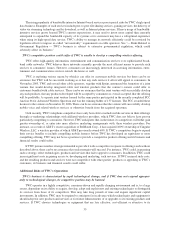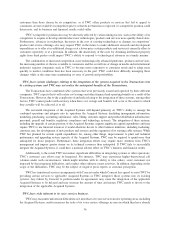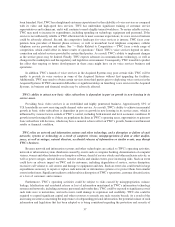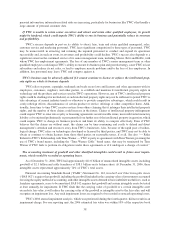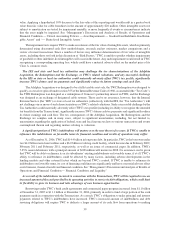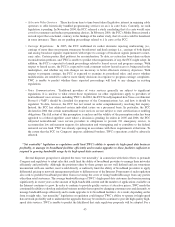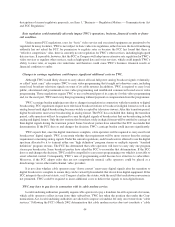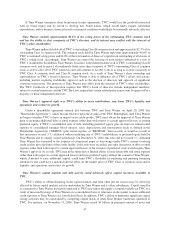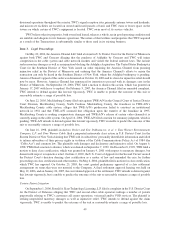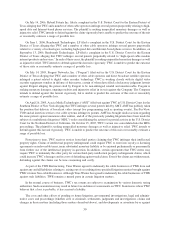Time Warner Cable 2006 Annual Report Download - page 45
Download and view the complete annual report
Please find page 45 of the 2006 Time Warner Cable annual report below. You can navigate through the pages in the report by either clicking on the pages listed below, or by using the keyword search tool below to find specific information within the annual report.payments on its indebtedness than it has in the past. This reduces the availability of TWC’s cash flow to fund
working capital and capital expenditures and for other general corporate purposes, may increase TWC’s vulner-
ability to general adverse economic and industry conditions, may limit TWC’s flexibility in planning for, or reacting
to, changes in its business and the industry in which it operates, may limit TWC’s ability to make strategic
acquisitions or pursue other business opportunities and may limit its ability to borrow additional funds and may
increase the cost of any such borrowings.
Risks Related to Dependence on Third Parties
Increases in programming costs could adversely affect TWC’s operations, business or financial results.
Programming has been, and is expected to continue to be, one of TWC’s largest operating expense items for the
foreseeable future. In recent years, TWC has experienced significant increases in the cost of programming,
particularly sports programming. The increases are expected to continue due to a variety of factors, including
inflationary and negotiated annual increases, additional programming being provided to subscribers, and increased
costs to purchase new programming.
Programming cost increases that are not passed on fully to TWC’s subscribers have had, and will continue to
have, an adverse impact on cash flow and operating margins. In addition, such increases could have an adverse
impact on cash flow and operating margins from new video products and services. Current and future programming
providers that provide content that is desirable to TWC’s subscribers may enter into exclusive affiliation agreements
with TWC’s cable and non-cable competitors and may be unwilling to enter into affiliation agreements with TWC
on acceptable terms, if at all.
In addition, increased demands by owners of some broadcast stations for carriage of other services or payments
to those broadcasters for retransmission consent could further increase TWC’s programming costs. Federal law
allows commercial television broadcast stations to make an election between “must-carry” rights and an alternative
“retransmission-consent” regime. When a station opts for the latter, cable operators are not allowed to carry the
station’s signal without the station’s permission. TWC currently has multi-year agreements with most of the
retransmission consent stations that it carries. In some cases, TWC carries stations under short-term arrangements
while it attempts to negotiate new long-term retransmission agreements. If negotiations with these programmers
prove unsuccessful, they could require TWC to cease carrying their signals, possibly for an indefinite period. Any
loss of stations could make TWC’s video service less attractive to subscribers, which could result in less
subscription and advertising revenue. In retransmission-consent negotiations, broadcasters often condition consent
with respect to one station on carriage of one or more other stations or programming services in which they or their
affiliates have an interest. Carriage of these other services may increase TWC’s programming expenses and
diminish the amount of capacity it has available to introduce new services, which could have an adverse effect on
TWC’s business and financial results.
TWC may not be able to obtain necessary hardware, software and operational support.
TWC depends on third party suppliers and licensors to supply some of the hardware, software and operational
support necessary to provide some of its services. TWC obtains these items from a limited number of vendors, some
of which do not have a long operating history. Some of TWC’s hardware, software and operational support vendors
represent TWC’s sole source of supply or have, either through contract or as a result of intellectual property rights, a
position of some exclusivity. If demand exceeds these vendors’ capacity or if these vendors experience operating or
financial difficulties, TWC’s ability to provide some services might be materially adversely affected, or the need to
procure or develop alternative sources of the affected materials might delay the provision of services. These events
could materially and adversely affect TWC’s ability to retain and attract subscribers, and have a material negative
impact on TWC’s operations, business, financial results and financial condition. Since late 2006, TWC has noted
increased demand for HDTV-capable set-top boxes. This increased demand comes at a time when TWC’s set-top
box suppliers need to begin making changes in their production processes to enable them to supply cable operators
with set-top boxes that use separate security. See “— Risks Related to Government Regulation — The FCC’s set-
top box rules could impose significant additional costs on TWC” below. As of February 20, 2007, TWC was
experiencing, and may continue to experience during the near term, difficulty in obtaining sufficient quantities of
HDTV-capable set-top boxes to satisfy all consumer requests for such boxes.
40




